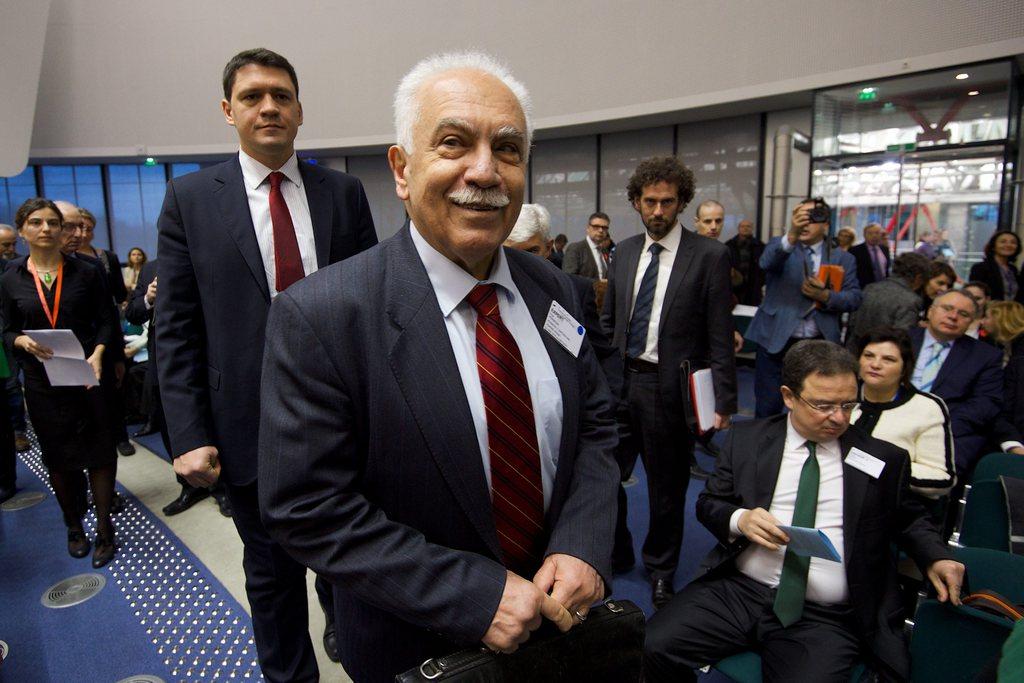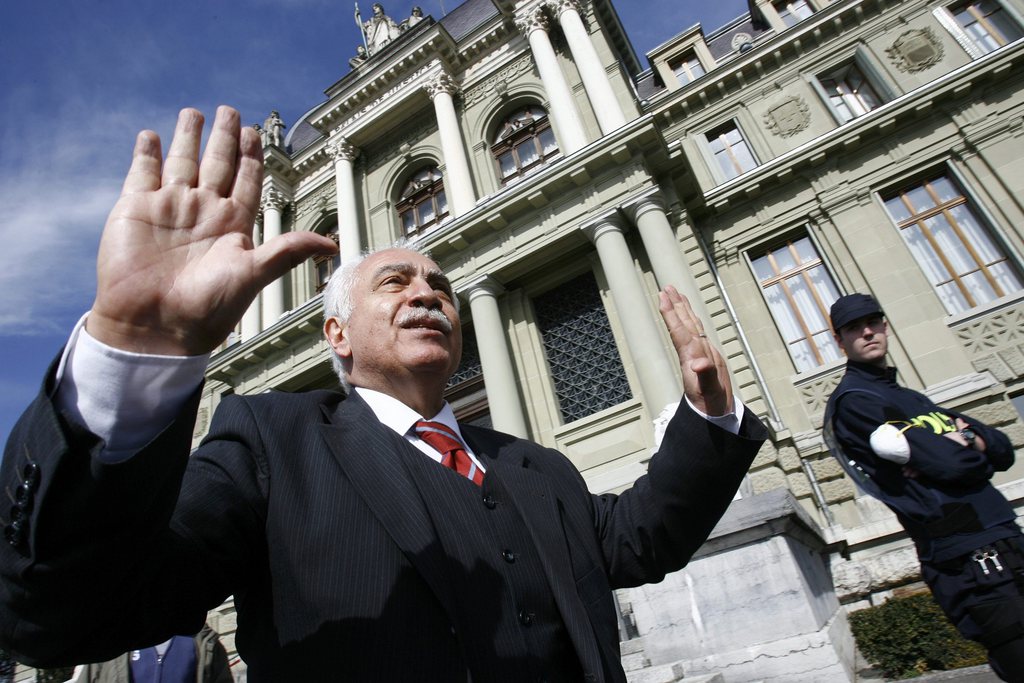European Court confirms Perinçek’s right to freedom of speech

The European Court of Human Rights (ECHR) has ruled that Switzerland violated Turkish politician Doğu Perinçek's right to freedom of speech. He had appealed against a conviction for racism after having denied the mass killing of Armenians.
In a first reaction, the Swiss Federal Office of Justice issued a statementExternal link on Thursday saying the court’s decision “confirms the great importance that the ECHR attaches to freedom of expression”, and that a “thorough analysis of the comprehensive judgment” is needed before it is clear whether the decision will spur reforms to Swiss anti-racism law.
The 10:7 majority decision of the 17-judge ECHR Grand Chamber is final, and puts to rest a string of legal decisions and appeals in the case of Perinçek vs Switzerland dating back to 2007.
Perinçek, chairman of the Turkish Patriotic Party, first made headlines in 2005 when he stated during three separate public events in Switzerland that the deaths of between 800,000 and 1,800,000 Armenians at the hands of the Ottoman Empire between 1915 and 1918 did not constitute genocide.
Censure
In its ruling, the court said Thursday that Perinçek’s remarks “did not amount to advocacy of hatred or intolerance”.
It noted that the Swiss courts appeared to have “censured [Perinçek] for having simply expressed an opinion divergent from those held in Switzerland”, and that Perinçek’s conviction had been “unnecessary” to protect the rights of the Armenian community.
In the next six months, Switzerland will present its intentions to the Committee of Ministers of the European Council, the body that monitors fulfilment of the ECHR court rulings.
The report must include Switzerland’s plan to “eliminate the consequences of the violation determined in this individual case, as well as to prevent such violations in the future”.
Strong reaction
The Switzerland-Armenia AssociationExternal link said it was “profoundly shocked” by the decision. It added that freedom of expression is not “absolute”, and cannot be used to “recreate history to deny or justify genocide”.
At a news conference in Bern on Thursday, Sarkis Shahinian, honorary chairman of the association, strongly criticsed the decision by the Strasbourg judges as “superficial and ignorant”.
Ueli Leuenberger, member of the parliamentary group Switzerland-Armenia, said he was disappointed by the ruling.
He called on the Swiss government to finally recognise the historical facts of the Armenian genocide. Leuenberger accused the government of giving in to pressure from the Turkish government.
The Association noted that the decision was made even more “revolting” by the fact that this year marks the 100th anniversary of the massacres.
In contrast, some of the groups representing Swiss people of Turkish descent expressed satisfaction with the court ruling but said historians were best equipped to judge the past.
One group, known by its French acronym FATSRExternal link, said the decision would encourage “reconciliation” among Turks and Armenians.
The case
At a celebration of the 82nd anniversary of the 1923 Treaty of Lausanne, which officially established the borders of modern-day Turkey, Perinçek said it was an “international lie” to classify the mass deaths of Armenians near the end of the First World War as genocide.
Because the event took place in Lausanne, Perinçek was accused of violating Swiss anti-racism legislation. The Switzerland-Armenia Association submitted an official complaint against Perinçek for his comments.
He was then charged on the grounds that denying, belittling or justifying genocide violates Swiss anti-racism law. Perinçek was tried and found guilty of racial discrimination by the Lausanne District Court in March 2007, and sentenced to fines and prison time.
Turkey has never officially recognised the deaths as genocide and maintains the estimate of 1.5 million Armenians killed is inflated.
The case launched against Perinçek exacerbated longstanding tensions between Turkey and Switzerland, related to the two countries’ conflicting interpretations of the Armenian massacres near the end of the First World War.
In 2001 and 2003, the Swiss cantons of Geneva and Vaud had officially recognised the deaths as genocide, and the House of Representatives followed suit at the end of 2003.
The timeline
• March 9, 2007: Doğu Perinçek is found guilty by the Lausanne District Court of violating Swiss anti-racism legislation.
• March 12, 2007: Perinçek appeals the Lausanne court’s decision.
• December 12, 2007: The Swiss Federal Court’s confirms the Lausanne court’s decision. Perinçek appeals to the European Court of Human Rights.
• December 17, 2013: The ECHR lower court rules that Perinçek’s incarceration violates his right to free speech under Article 10 of the European Convention on Human Rights.
• March 17, 2014: Switzerland appeals the ECHR lower court ruling to the ECHR Grand Chamber.
• January 28, 2015: A preliminary hearing of the ECHR appeal is held. Perinçek is represented by Laurent Pech of the Law Department at Middlesex University in London. Turkey was represented as a third party by Stefan Talmon of Oxford University. Switzerland was represented by lawyer Franck Schürmann, and Armenia was represented as a third party by the Doughty Street Chambers legal firm, including well-known international human rights lawyer Amal Clooney.
• October 15, 2015: The ECHR Grand Chamber confirms the lower court’s decision that Switzerland violated Perinçek’s right to freedom of speech.

In compliance with the JTI standards
More: SWI swissinfo.ch certified by the Journalism Trust Initiative













You can find an overview of ongoing debates with our journalists here . Please join us!
If you want to start a conversation about a topic raised in this article or want to report factual errors, email us at english@swissinfo.ch.